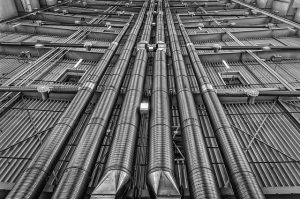
Metals can typically be classified as either ferrous or non-ferrous depending on their composition. All metals are comprised of metallic elements that form positive ions and possess metallic bonds. Their composition, however, varies depending on the type. To learn more about ferrous metals and how they differ from their non-ferrous counterparts, keep reading.
An Introduction to Ferrous Metals
A metal is considered ferrous if it contains iron. The term “ferrous,” in fact, was derived from the Latin word “ferrum,” meaning “iron.”
Iron is the fourth most common element in the Earth’s crust. It’s also believed to be found in large quantities in the Earth’s core. Iron, of course, has several properties that make it a valuable and versatile material. It’s malleable, strong, magnetic, conductive and ductile. With these properties, iron and metals containing iron are used extensively in the manufacturing industry. Ferrous metals consist of any metal or alloy that contains a meaningful amount of iron, so they exhibit these same attractive properties.
Common Types of Ferrous Metals
While iron itself is a ferrous metal, it’s not the only ferrous metal. There are many other metals, as well as alloys, that contain iron. When iron is present, it’s considered a ferrous metal.
Here are some of the most common types of ferrous metals:
- Iron
- Cast iron
- Carbon steel
- Stainless steel
Ferrous vs Non-Ferrous Metals
There are also non-ferrous metals, which as you may have guessed, don’t contain iron. They consist of other metals without any significant amount of iron. All metals and alloys are considered non-ferrous if they are comprised of little or no iron.
Non-ferrous metals don’t exhibit the same properties as ferrous metals. Without any meaningful amount of iron, they typically aren’t conductive, nor are they are magnetic. With that said, non-ferrous metals still have some attractive properties, which aren’t found in ferrous metals. For starters, non-ferrous metals are better protected against corrosion. Iron can rust when exposed to moisture. Since non-ferrous metals don’t contain iron, they are protected from rusting. Non-ferrous metals are often harder than ferrous metals as well.
Common types of non-ferrous metals include:
- Aluminum
- Copper
- Brass
- Nickel
- Titanium
- Zinc
In Conclusion
Although there are dozens of metals and alloys, they can all be classified as either ferrous or non-ferrous. Ferrous metals are those that contain a meaningful amount of iron. In comparison, non-ferrous metals are those that contain little or no iron.
